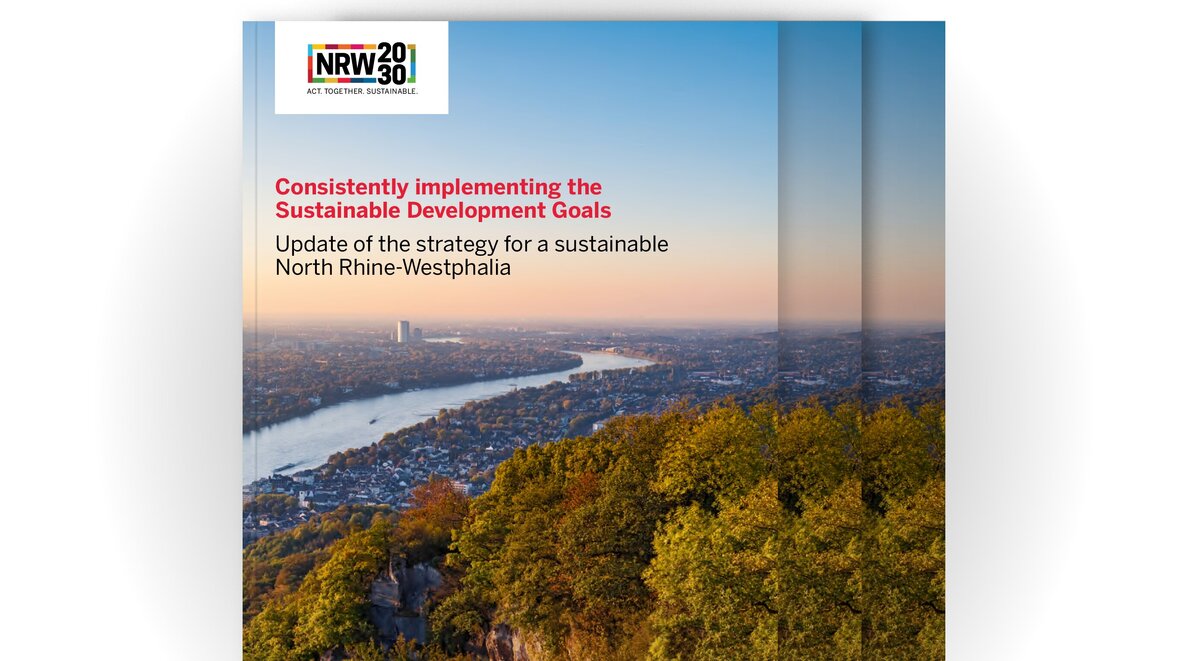Sustainability Strategy NRW 2020
In September 2020, the state government of North Rhine-Westphalia adopted an updated second sustainability strategy that was supplemented with important future topics. With a variety of goals and measures, the strategy shows the way to sustainable living and economic activity in the most populous federal state of Germany.

Five years after the adoption of the “2030 Agenda for Sustainable Development” the state government of North Rhine-Westphalia is closely focusing on the 17 sustainable development goals (SDGs) with its new sustainability strategy. With the strategy, the state government is also addressing the particular challenges of sustainable development for North Rhine-Westphalia in terms of state policy and presenting its contributions to achieving the goals of the 2030 Agenda.
Content, goals and measures of the new strategy of North Rhine-Westphalia are now also closely aligned with the systematics of the sustainability strategy of Germany. The aim is to ensure that the activities of Germany and of North Rhine-Westphalia support each other and that a substantial overall German contribution to the implementation of the SDGs can be achieved.
The core of the new sustainability strategy is a set of 67 goals and indicators. These are closely interlinked with the goals at federal level of German Bundesregierung and are based on the sustainable development goals that the United Nations adopted on September 25, 2015 with the 2030 Agenda. Ecology, economy and social matters are equally taken into account within the NRW sustainability strategy of North Rhine-Westphalia.
The range of goals and indicators ranges from an increase in organic farming to 20 percent of the agricultural area, to strengthening the green economy as an important future segment, to a minimum investment of 3.5 percent of GDP in innovations and solutions. Further indicators describe the expansion of all-day care in elementary school age or the increase in raw material productivity by 2030 (see all goals and indicators in the strategy, download below). The strategy also includes important future topics such as digitalization, the circular economy and electro mobility.
„North Rhine-Westphalia is a pioneering state: We show how sustainability can be achieved here in a highly developed and densely populated industrial country in the heart of Europe.” – Former Prime Minister of North Rhine-Westphalia, Armin Laschet
The sustainability strategy was developed in close cooperation with all ministries of the NRW state government, under the leadership of the Ministry of the Environment, Agriculture, Nature Conservation and Consumer Protection. The path towards the further development of the (first) NRW Sustainability Strategy was paved by a state secretary's decision in spring 2018. One aim of the further development was to strengthen vertical integration in the multi-level political system, i.e. improved interaction with the German Sustainability Strategy and the United Nations' 2030 Agenda. The increased convergence and coordination with the federal strategy is intended to achieve a greater impact and thus a more comprehensive German contribution to the implementation of the UN Sustainable Development Goals (SDGs). Another key motivation for further development was to focus on the issues and challenges that particularly affect NRW.
With the aim of further strengthening the participation of non-governmental actors beyond the current high level, the state government will set up an NRW Sustainability Advisory Council to accompany the implementation, evaluation and further development of the sustainability strategy.


